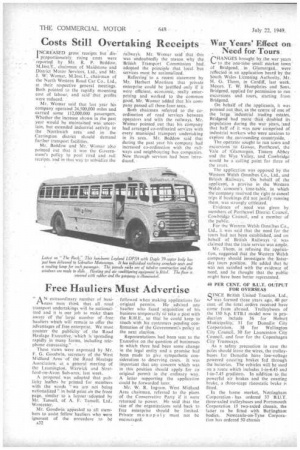War Years" Effect on Need for Tours. .
Page 8

If you've noticed an error in this article please click here to report it so we can fix it.
CHANGES brought by the.war years to the "one-tithe small market town' of Bridgend, in . Glamorgan,. were reflected in an application heard by the South Wales Licensing Authority, Mr. H. G. Thom, in Cardiff, last week. Messrs. T. W. Humphries and Sons. Bridgend, applied for permission to run excursions and tours, starting from Bridgend.
On behalf of the applicants, it was pointed out that, as the centre of one of the large industrial ,trading estates. Bridgend had more than doubted its population during the war years, and that half of it was now comprised of industrial workers who were anxious to explore the .surrounding countryside.
The operator sought to run tours and excursions to Gower, Porthcawl, the Vale of :Glamorgan, Tintern Abbey and the Wye. Valley, and Cowbridge would be a calling point for three of the tours.
The application was opposed by the Western Welsh Omnibus Co., Ltd., and British Railways. On behalf of the applicant, a proviso in the Western Welsh .concern's time-table, in which the company reserved the right to cancel trips if bookings did not justify running them, was strongly criticized.
Evidence of need was given by members of. Porthcawl District Council, Cowbridge Conned, and a member of
the public. '
For the Western Welsh Omnibus Co., Ltd.. it was said that the need. for the tours had not been established, and on behalf of British Railways 'ii was claimed that the train service was ample.
Mr. Thom, in refusing the application, suggested that the Western Welsh company should investigate the Saturday tours position. He added that he was not satisfied with the evidence of need, and he thought that the public might have been better represented.


























